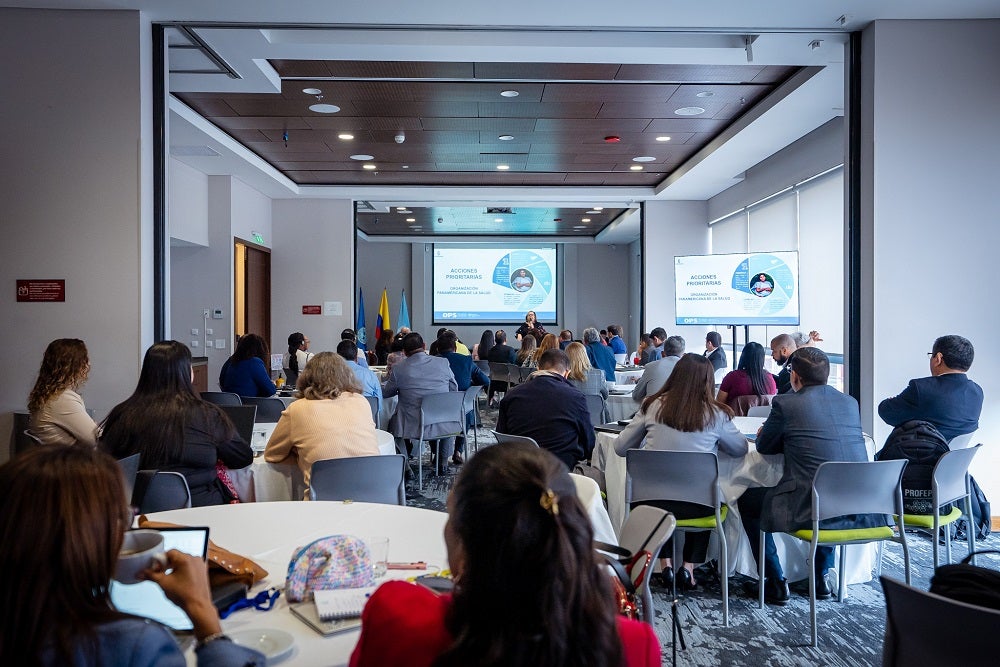
Montevideo, 6 November 2024. In response to the need to accelerate the reduction of maternal mortality in the Americas, especially after the setbacks caused by the COVID-19 pandemic, the Pan American Health Organization (PAHO) convened a regional workshop in Bogota, Colombia, on 21-22 October. This event focused on the need to improve the measurement and monitoring of maternal mortality, and the implementation of national and subnational strategies, in the framework of the Call to Action issued by PAHO Director, Dr. Jarbas Barbosa in June 2024.
Call to Action: Zero Preventable Maternal Deaths
The call to action places strong emphasis on strengthening primary health care (PHC) as a pillar for reducing preventable maternal deaths. The proposed strategy has six strategic lines of action and seeks to align the efforts of all countries in the region, prioritising sustainable interventions focused on equity in access to quality maternal health services.
The director of PAHO's Latin American Centre for Perinatology, Women's and Reproductive Health (CLP/WR), Dr. Suzanne Serruya, explained that 12 priority countries were identified for the implementation of the strategy: Bolivia, Brazil, Colombia, Dominican Republic, Guatemala, Haiti, Honduras, Jamaica, Mexico, Paraguay, Peru and Venezuela.
Serruya said that this strategy is a framework, but it is necessary for each country to take ownership of this document to adapt it to the needs and realities of each territory. ‘We, at PAHO, are here to accompany and support the ministries to ensure proper implementation,’ she said.
Background and challenges
According to data from the Maternal Mortality Estimation Interagency Group (MMEIG), between 2000 and 2014, the maternal mortality ratio (MMR) in the Americas experienced an average annual reduction of 1.2%, significantly slower than the global average. Furthermore, between 2015 and 2020 the regional MMR increased from 58 to 68 maternal deaths per 100,000 live births, representing an average annual increase of 3.1% and marking a worrying deviation from global trends of continued reduction.
The COVID-19 pandemic further exacerbated vulnerabilities in the region's health systems, intensifying existing disparities in access to essential maternal health services. As a result, the pandemic contributed to excess maternal mortality, disproportionately affecting women and adolescent girls who already faced significant barriers to accessing quality health care even before the crisis.
PAHO's regional advisor on maternal health, Bremen De Mucio, said it is important to focus on a rights and social justice perspective. "The vast majority of maternal deaths are preventable. It is an issue that should challenge us all and that is why it is urgent to act accordingly’.
Quality of information, estimates and monitoring of maternal mortality
Strengthening the capacity of national teams to make accurate estimates is crucial to reduce maternal mortality. During the workshop, problems such as under-reporting and misclassification of deaths, especially in indirect obstetric cases, were noted. Improving medical certification, coding and selection of causes of death is essential. In addition, the implementation of active methods to analyse maternal deaths and deaths of women of childbearing age was highlighted in order to obtain more accurate data to prevent future deaths and reduce under-reporting.
The Maternal Mortality Estimation Interagency Group (MMEIG) plays a key role in providing internationally comparable estimates. Differences between national and international estimates were discussed, as well as their limitations. For effective monitoring, it was proposed to disaggregate data by dimensions of inequality and to use interactive dashboards to visualise trends, inequalities, and adjust policies. In addition, a methodology for setting MMR targets at sub-national and national levels, applying a progressive approach according to different geographical strata, was presented. Finally, the importance of political commitment to set clear targets and reduce inequalities in maternal mortality at subnational and national levels was highlighted.
This initiative, supported by Global Affairs Canada through the Improving the Health of Women and Adolescent Girls in Vulnerable Situations (IHWAG) project, aims to strengthen health systems, improve the reliability of maternal health-related data and promote evidence-based interventions that lead to a sustainable reduction in maternal mortality in the Americas.




